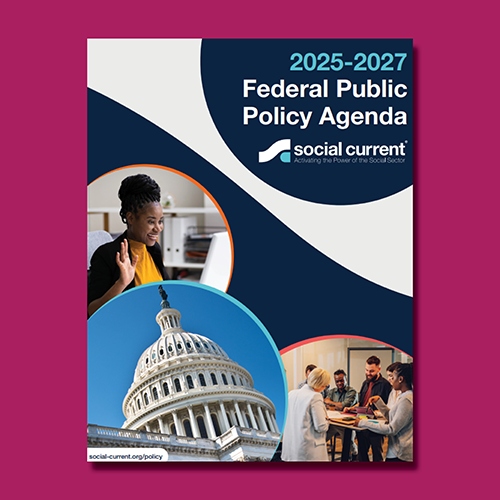Advocate
2025-2027 Federal Public Policy Agenda
This agenda is our roadmap for turning shared aspirations into action and ensuring that social sector organizations and leaders have the tools, resources, and support needed to thrive.
Advocate
This agenda is our roadmap for turning shared aspirations into action and ensuring that social sector organizations and leaders have the tools, resources, and support needed to thrive.
 Social Current’s 2025-2027 Federal Public Policy Agenda reflects our unwavering commitment to activating the power of the social sector as a driving force for change. This agenda is our roadmap for turning shared aspirations into action and ensuring that social sector organizations and leaders have the tools, resources, and support needed to thrive. It is a bold expression of our mission, vision, and values, designed to strengthen the sector and help create a society where all people can reach their full potential.
Social Current’s 2025-2027 Federal Public Policy Agenda reflects our unwavering commitment to activating the power of the social sector as a driving force for change. This agenda is our roadmap for turning shared aspirations into action and ensuring that social sector organizations and leaders have the tools, resources, and support needed to thrive. It is a bold expression of our mission, vision, and values, designed to strengthen the sector and help create a society where all people can reach their full potential.
At Social Current, we advocate for and implement solutions to society’s toughest challenges through collaboration, innovation, and practice excellence. Our vision is clear: To ignite change—and the collective power of the social sector—to create an equitable society where all people can thrive. These policy priorities, developed with input from the Social Current network, reflect our commitment to our values.
This policy agenda channels our vision and values into specific, actionable priorities that address systemic challenges, build resilience, and create opportunities for organizations to deliver a more significant impact.
The 2025-2027 Federal Public Policy Agenda is grounded in the belief that we strengthen communities by strengthening the social sector. It highlights critical areas that are essential to the sector’s ability to deliver vital services:
These priorities are rooted in our intention to amplify the sector’s voice and ensure its success. Our policy agenda aims to support the social sector by focusing on policies that address barriers, provide sustainable resources, and empower organizations to fulfill their missions. Together, we are building a more robust, unified network of social sector champions that drives solutions, inspires action, and makes lasting change possible.
A resilient human service workforce is essential to helping communities thrive. By improving compensation, retention, and training, Social Current strives to sustain and strengthen the workforce. We seek to advance policies that reduce financial barriers, support worker well-being, and incentivize investment in workforce health.
For human services organizations to achieve operational excellence, they require robust, sustainable financial health. To foster a financial environment that allows organizations to direct resources toward impactful services and remain vital resources to their communities, we will advocate for multiyear, stable funding; streamlined grant processes; transparent contracts; and protecting 501(c)(3) organizations from additional tax burdens.
Human services organizations face significant challenges securing affordable liability insurance. Liability insurance is essential for protecting these organizations from risks associated with providing critical services, particularly in child welfare and mental health. Ensuring accessible and affordable liability insurance options will reduce financial burdens and help organizations focus on their missions.
Ensuring access to health and wellness supports fosters proactive, community-centered solutions that empower individuals and families. This approach encompasses trauma recovery, integrated behavioral health services, crisis intervention, and expanded mental health resources, creating a foundation for resilience and well-being.
Priority Actions
Join Social Current’s grassroots advocacy network to be alerted about new advocacy opportunities and tools and resources, and subscribe to the Policy and Advocacy Radar to receive our biweekly policy newsletter.
Learn more about Social Current’s government affairs and advocacy work.